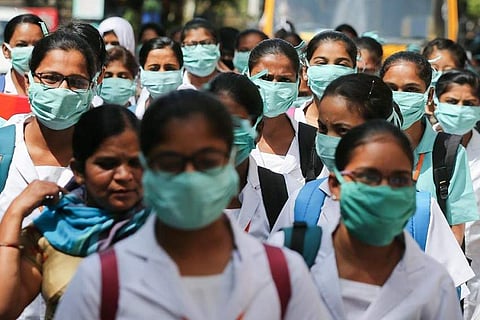

The University Grants Commission released a set of guidelines for the reopening of universities and colleges across the country on November 5. The statement from UGC Secretary Dr Rajnish Jain said that the safety and security of the students, teachers and staff is their 'top priority'.
The UGC has asked institutions to makes sure that the staff and students are trained to keep the campus safe and healthy and prevent any further outbreak. "The institutions should train their staff and students to assist and undertake the work related to safety and health to prevent an outbreak of the pandemic in their campuses. Non-resident students should be allowed on campuses only after thermal scanning, sanitisation of their hands, wearing face masks and gloves. Symptomatic persons should not be permitted to enter the campus and should be advised to contact the nearest hospital for clinical assessment," said the guidelines.
But this might turn out to be a herculean task and the universities might not have the funds to sanitise campuses according to Jadavpur University Teachers' Association General Secretary Dr Partha Pratim Roy. "We have a huge campus and to sanitise it you would need a considerable fund sanction. How will the university pay for it? We hardly have enough (funds) to repair or by lab equipment," said Dr Roy.
The UGC guidelines also go on to say that the teaching hours should be extended and class sizes should be reduced. "Teaching hours in a day may be extended, as per requirements of the institution. A six-day schedule may be followed so that classes can be conducted in phases and the seating arrangement be made keeping in view the requirements of physical distancing. Universities and colleges may consider reducing the class size and break them in multiple sections to maintain physical distancing during the classes," it added.
The statement from the UGC also mentions that the regulations should be adapted according to the local needs of the institutions. Dr Aabha Dev Habib, Treasurer, Delhi University Teachers' Association who teaches Physics at Miranda House said that customising the regulations is very important. "Institutions need to draw their own guidelines in view of their specific conditions. For a university like DU, the first crucial matter is the safety of outstation students. We have close to 80,000 outstation students. DU is not able to accommodate more than 7-10 per cent outstation students in its hostels," she said and added that online teaching has "damaged the experience of education and marginalised a huge section of students". "We need to move towards a hybrid model wherein lectures may be attended through online mode but tutorials and practicals for small groups are conducted on campus. Shortage of classrooms/big- sized lecture halls in colleges may be yet another issue which institutions may face in shifting to hybrid or offline mode," she said.
Most Indian universities have jam-packed classrooms and to maintain social distancing or breaking them up into groups would be difficult, said Dr Roy. "What the UGC has recommended is impossible. They have just put down what sounds good on theory. This is nothing but a way to avoid the onus of the entire situation. We have around 40 students in each class and it is not possible to maintain social distance there," he added.
